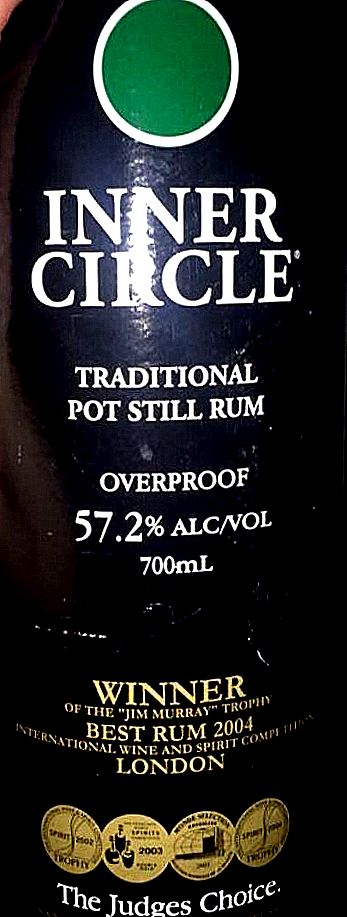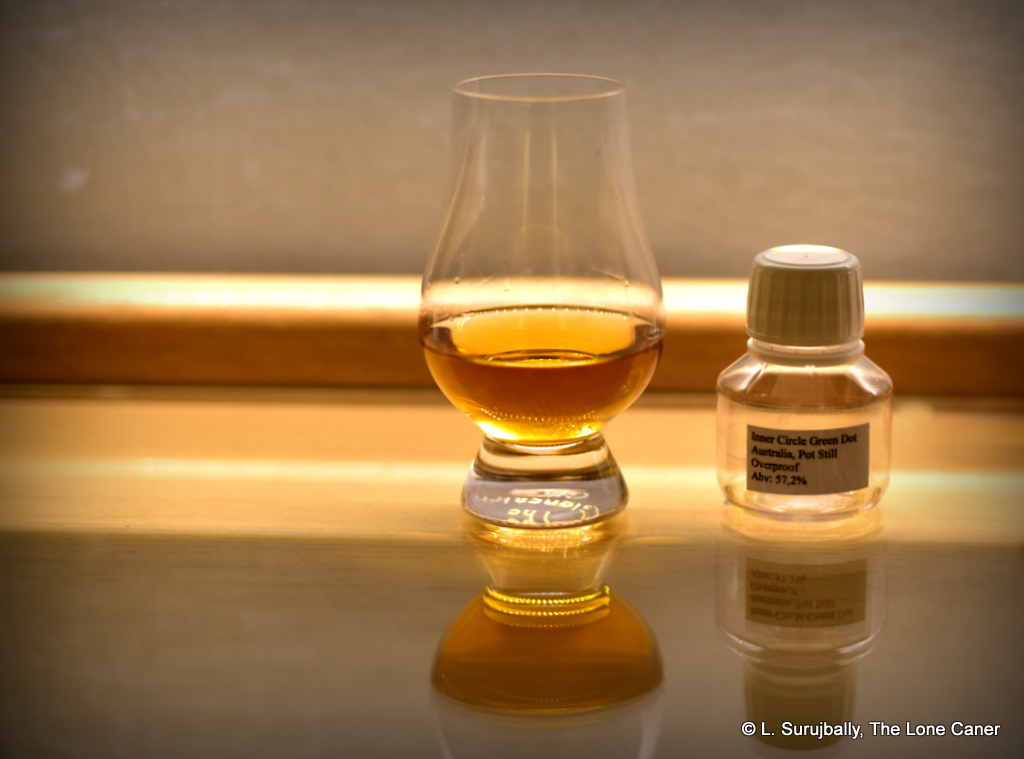 Rumaniacs Review # 096 | 0617
Rumaniacs Review # 096 | 0617
Inner Circle out of Australia is one of those rums originally made by a now-defunct company called the Colonial Sugar Refinery, which had a long history pretty much unknown outside its country of origin. Formed in 1855, CSR established refineries in Australia, New Zealand and Fiji by the 1890s, and in 1901 they opened a distillery in Sidney, using pot stills to make rums from Fijian and Australian cane. The Inner Circle brand name, which appeared in 1950, came from the limited high-quality rums they made for distribution to the favoured elite of the company and its clients, and around 1970 it got a broad commercial release in Australia: at that time it was bottled in three strengths, which in turn were identified by coloured dots – Underproof (38-40%, the red dot), Overproof (57% or so, green dot) and 33% Overproof (73-75%, black dot).
The distillery was sold off in 1986 (to Bundaberg) and the brand disappeared, though CSR remains as a company involved in manufacturing of building products, no longer rums. The Inner Circle brand was resurrected in 2000 by Stuart Gilbert (the Australian Olympic yachtsman) in concert with Malcolm Campbell, one of the distillers of the company who had the original recipe, and I believe they did so with the financial backing of the Australian VOK group, which also took over the Beenleigh Rum Distillery in 2003. The rums was resurreected and is now a Beenleigh product
The rum remains a pot still rum; and based on the label design, it was bottled just after 2004. Inner Circle confirmed to me directly that it was 2004-2007 (and if I could find the batch code on the label they could tell me the exact year), pure Fijian cane distillate (so not really Australian after all), minimum of two years ageing in bourbon casks, and this particular batch recipe is no longer being made – hence its inclusion in the Rumaniacs series. It’s still possible to find bottles for sale at reasonable prices, mind you — this one was bought at auction last year.
Colour – Amber
Strength 57.2%
Nose – Are we sure this is a pot still 57.2% rum? Very strange, because nothing much seems to be going on here at all. It’s slightly sweet, fruit forward (peaches, apricots, cherries, very ripe). Characteristic brine and olives and acetones of a pot still distillate seem completely absent, and so it is nowhere near as complex as even an entry level funky Jamaican. After half an hour of letting it stand, and then rechecking I got some sweet vegetables (carrots) and a bit of glue and nail polish, really faint.
Palate – Same vague wispiness as the nose. Glue and rubber notes, very faint. A bit sweet and salty with repeated sips diminishing the sweet. Some light pineapples, dried apricots, cinnamon. A bit of caramel and vanilla, not much but all things considered, it had more potency and pungency than the nose did (and for me usually the reverse is true). There’s a trace of iodine and seaweed in the background, which is odd, but by no means unpleasant.
Finish – Short, warm. Some vegetables, brine, fish soup and sushi (that would be that iodine coming back again – odd that it wasn’t discernible on the nose). A bit of vanilla and caramel.

Thoughts – Leaves me indifferent, largely because it’s as vague as a politician’s statements. Maybe it was filtered or something, but overall, it simply does not conform to what we might expect from the strength and still as noted on the label. Which is a shame, ‘cause I had high hopes for it, but also relieved, since I dropped out of the bidding.
(73/100)
Other notes:
- A redesigned bottle and revised recipe of the Inner Circle line of rums continues to be made.
- Thanks to Tatu Kaarlas and Inner Circle themselves, who responded in fine style when bugged for background information
- Sample came from the same bottle whose label is shown at top, from Nicolai W. out of Denmark, who ended up buying it.
- A more detailed history of the company can be found here.
I can’t remember what I thought of this back in the mid-2000s. The current version, in a different shaped flat bottle, is my preferred day-to-day rum. It’s excellent value considering its ABV. Flavor-wise it’s streets ahead of the likes of Captain Morgan and the horrible Bundaberg varieties which are so popular here in Australia. Sadly the brand’s had a chequered history, having changed hands three or four times this century. Hopefully the latest owners, the Australian Vok group, will provide stability.
As an update: this rum has been repackaged and relaunched with a 15% price increase, meaning its value for money is no longer outstanding. There’s no information about whether the blend has changed.
Thanks for the heads up and update, Ken.
After your experiences with Bundy I am surprised you went anywhere near another Australian rum. For what it’s worth, the Colonial Sugar Refinery still exists, it’s listed on the ASX as CSR Ltd., but they make building products these days, not booze. My understanding, happy to be corrected, is that the Inner Circle brand is now owned by a company called Vok Beverages, which also owns the Beenleigh rum brand. Give the Beenleigh 5 Year Old a go, it won’t change your life but it’s one of those rums that are like pulling on a pair of comfortable old sneakers. All that aside, please don’t let this latest experience of Australian rum turn you off them, there’s a bunch of small distilleries making outstanding rums here in Oz at the moment.
It’s the evolution of the site, Simon. After writing this much over so many years, there’s a sort of compulsion to write about every rum I can, and Australia and Asia are gaping gaps in the lineup. I’d never ignore them entirely.
Too, small distilleries producing interesting rums are springing up (or finally getting noticed), and it would be remiss of me to ignore them just because I disliked the Bundie or was relatively indifferent to this one. I want to try as many as I can, to be honest 🙂
I’ve updated the post to take into account the VOK connection, which I had neglected to emphasize before.
I am pretty sure the CSR that used to make the rum in Fiji under Bounty and Inner Circle in Australia had the same recipe. They both taste the same .. could be coz they use Fiji Sugar cane in both…